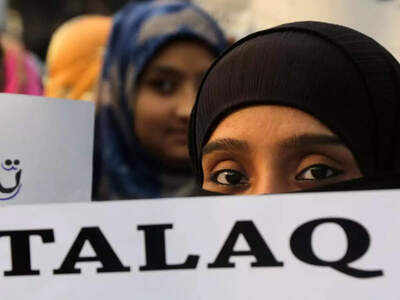Top Searches
- News
- India News
- Modi 2.0's triple talaq law: A pro-women reform mired in communal politics
Modi 2.0's triple talaq law: A pro-women reform mired in communal politics

NEW DELHI: One of the most significant political achievements of the Modi government in its second term in office has been the passage of the triple talaq bill in Parliament, a law that made instant triple talaq a criminal offence.
The triple talaq law, formally called the Muslim Women (Protection of Rights on Marriage) Act, 2019, was passed on August 1, 2019 after intense debates in Parliament.
The fact that the BJP could get the Bill passed in Rajya Sabha where it did not have majority showed the astute political management of the ruling party which had retained power in 2019 with a historic mandate.
In a political masterstroke, the ruling BJP government led by Prime Minister Narendra Modi aggressively pitched for ban on instant triple talaq calling it a huge step for the empowerment of Muslim women.
The opposition questioned the government's selective concern for the community and accused it of playing politics over a sensitive issue.
However, wary of the charge of "appeasement politics" by the BJP, their arguments against the government move were rather muted and mostly on technicalities.
A year after the law, there was a reported decline of about 82 per cent in triple talaq cases, according to the government data. Violations have been dealt firmly according to the provisions of the new law.
Triple Talaq or Talaq-a-Biddat, which is not permitted in Islam, was on May 18, 2017, declared as unconstitutional by the Supreme Court.
Here’s a timeline of how the triple talaq bill became a law-
March 28, 2016: Supreme Court asks the government to file a report on “Women and the law: An assessment of family laws with a focus on laws relating to marriage, divorce, custody, inheritance and succession”.
February 16, 2017: Supreme Court forms five-judge constitutional bench to discuss challenges relating to triple talaq and nikah halala.
March 2017: All India Muslim Personal Law Board (AIMPLB) tells Supreme Court that triple talaq falls outside the purview of judiciary.
May 18, 2017: Supreme Court reserves verdict on appeals questioning constitutional validity of instant triple talaq.
August 22, 2017: Supreme Court declares practice of triple talaq illegal. Asks Centre to frame a law.
The triple talaq law, formally called the Muslim Women (Protection of Rights on Marriage) Act, 2019, was passed on August 1, 2019 after intense debates in Parliament.
The fact that the BJP could get the Bill passed in Rajya Sabha where it did not have majority showed the astute political management of the ruling party which had retained power in 2019 with a historic mandate.
In a political masterstroke, the ruling BJP government led by Prime Minister Narendra Modi aggressively pitched for ban on instant triple talaq calling it a huge step for the empowerment of Muslim women.
The opposition questioned the government's selective concern for the community and accused it of playing politics over a sensitive issue.
However, wary of the charge of "appeasement politics" by the BJP, their arguments against the government move were rather muted and mostly on technicalities.
A year after the law, there was a reported decline of about 82 per cent in triple talaq cases, according to the government data. Violations have been dealt firmly according to the provisions of the new law.
Triple Talaq or Talaq-a-Biddat, which is not permitted in Islam, was on May 18, 2017, declared as unconstitutional by the Supreme Court.
Here’s a timeline of how the triple talaq bill became a law-
March 28, 2016: Supreme Court asks the government to file a report on “Women and the law: An assessment of family laws with a focus on laws relating to marriage, divorce, custody, inheritance and succession”.
February 16, 2017: Supreme Court forms five-judge constitutional bench to discuss challenges relating to triple talaq and nikah halala.
March 2017: All India Muslim Personal Law Board (AIMPLB) tells Supreme Court that triple talaq falls outside the purview of judiciary.
May 18, 2017: Supreme Court reserves verdict on appeals questioning constitutional validity of instant triple talaq.
August 22, 2017: Supreme Court declares practice of triple talaq illegal. Asks Centre to frame a law.
FacebookTwitterLinkedinEMail
Start a Conversation
end of article
Quick Links
Coronavirus in MumbaiFarm bill 2020Farmers protestCoronavirus in DelhiCoronavirus in BangaloreCoronavirus symptomsCoronavirus in IndiaWest Bengal elections 2021Coronavirus NewsSolar EclipseNPRWhat is NRCCAB BillCAB and NRCAssam election 2021Podcast newsLok SabhaTamil Nadu Election 2021CongressBJP newsKerala Elections 2021Indian ArmyISRO newsSupreme Court
